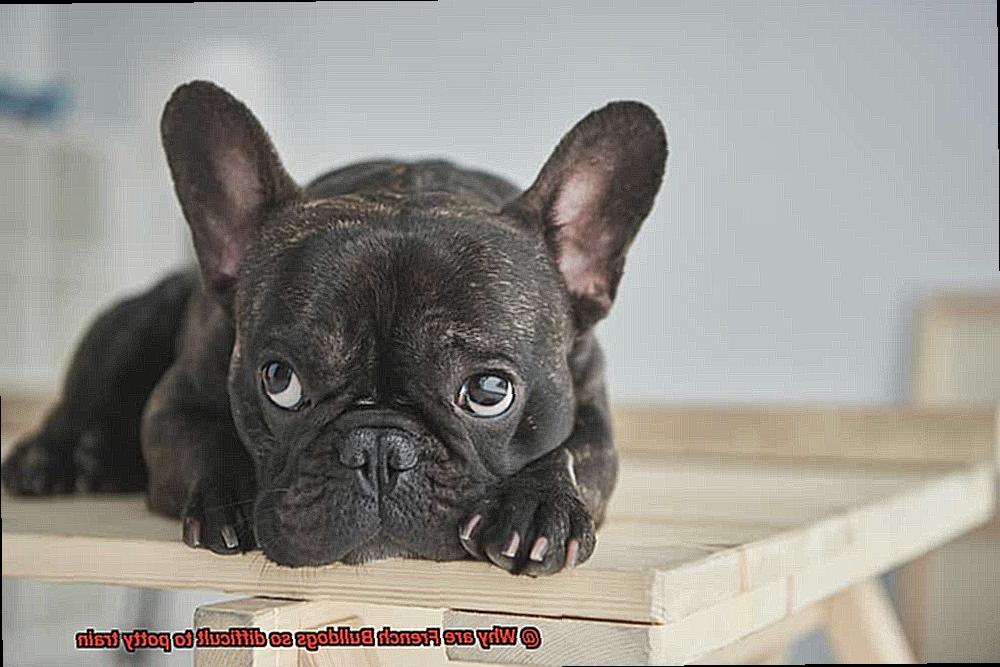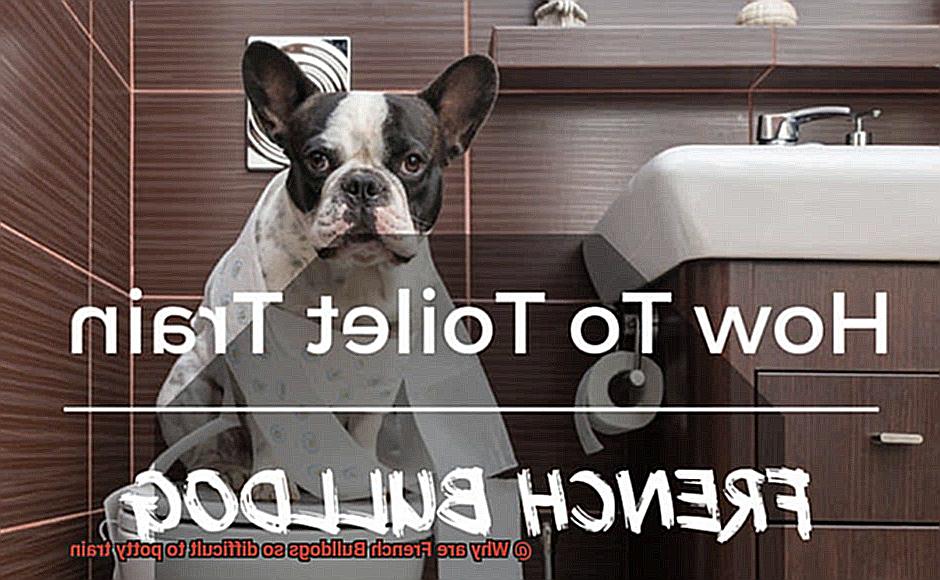Why are French Bulldogs so difficult to potty train?
The French Bulldog – those adorable bundles of joy with their irresistible looks and playful antics. These pint-sized charmers have won over dog lovers worldwide. But there’s one puzzle that leaves many owners scratching their heads in frustration: potty training.
In this captivating journey, we’ll unravel the mysteries behind why French Bulldogs can be so tricky to potty train. Get ready to explore their stubbornness, quirks, and unique traits that contribute to this perplexing predicament.
From their fascinating breeding history to their strong-willed personalities, French Bulldogs present a challenge for pet owners. These little four-legged rascals often seem to have a mind of their own, making potty training an inconvenient struggle.
But don’t worry. Our adventure will also provide insights and potential solutions to help you conquer this hurdle. By understanding the factors that make potty training French Bulldogs more complicated than other breeds, we can arm ourselves with knowledge and patience needed to overcome this challenge.
So, if you’re eager to dive into the world of French Bulldogs and uncover the secrets behind their potty training difficulties, let’s embark on this exciting journey together. Prepare to be amazed, entertained, and equipped with the tools to conquer the potty training puzzle and enjoy a harmonious life with your beloved French Bulldog.
The Stubborn Nature of French Bulldogs
Contents
- 1 The Stubborn Nature of French Bulldogs
- 2 Sensitive Digestive System of French Bulldogs
- 3 Small Bladder Size of French Bulldogs
- 4 Brachycephalic Anatomy and Its Impact on Potty Training
- 5 Low Activity Levels of French Bulldogs
- 6 Inconsistent or Ineffective Training Methods
- 7 Tips for Potty Training a French Bulldog
- 8 Common Mistakes to Avoid When Potty Training a French Bulldog
- 9 Conclusion
Yes, you heard it right. These adorable little pooches can be quite a handful when it comes to potty training. But fear not, fellow Frenchie owners. With a little patience, consistency, and a few tricks up your sleeve, you can conquer even the most stubborn of French Bulldogs.
Understanding the Stubborn Nature:
French Bulldogs have an independent streak that rivals their size. They often have their own agenda and may need some convincing to follow your potty training rules. Their stubbornness can manifest in various ways, such as ignoring commands or being easily distracted during training sessions.
Establishing Consistent Routines:
Consistency is key when it comes to potty training your Frenchie. Set a routine and stick to it religiously. Take them outside at regular intervals throughout the day, especially after meals or naps. Supervision is crucial to prevent accidents inside the house and redirect them to the appropriate bathroom area outside.
Positive Reinforcement:
French Bulldogs respond well to positive reinforcement techniques. Use treats, praise, and affectionate gestures to motivate them and reward their desired behavior. However, be careful not to rely solely on treats as this breed may lose interest if the rewards are not consistently provided.
Patience Is a Virtue:
When it comes to potty training, patience is non-negotiable. Yelling or punishing your Frenchie for accidents will only hinder their progress. Instead, remain calm and guide them gently towards the right behavior. Remember, Rome wasn’t built in a day.
Additional Training Methods:
Some French Bulldogs may require additional training methods to aid in potty training success. Crate training can help establish a designated elimination area and teach them bladder control. Indoor potty pads can also be useful for transitioning from indoor to outdoor potty training.
Seek Professional Help:
If you’re struggling with potty training your Frenchie, don’t hesitate to seek professional help. A dog trainer or behaviorist can provide personalized guidance and techniques tailored to your dog’s specific needs. They can be a valuable resource in overcoming stubbornness and achieving successful potty training.
Never Lose Hope:
Remember, every French Bulldog is unique, and progress may vary. Don’t lose hope if you encounter setbacks along the way. Stay consistent, patient, and positive, and eventually, your Frenchie will catch on.
Sensitive Digestive System of French Bulldogs
French Bulldogs are known for their lovable personalities and unique appearance, but they also have a sensitive digestive system that can pose challenges during potty training. Understanding the reasons behind their sensitive digestion and implementing the right strategies can help owners successfully potty train their furry friends.
Unique Dietary Needs
French Bulldogs require a balanced diet that is rich in high-quality protein and low in fillers and artificial additives. Their delicate stomachs cannot tolerate certain ingredients commonly found in commercial dog food, such as grains, soy, and dairy products. To ensure a healthy digestive system, opt for dog food specifically formulated for French Bulldogs or consult with a veterinarian or canine nutritionist to create a customized diet plan.
Food Allergies and Sensitivities
Food allergies and sensitivities are common among French Bulldogs. Some individuals may develop adverse reactions to specific ingredients, leading to gastrointestinal distress and irregular bowel movements. Identifying these allergies is essential for successful potty training. Keep a close eye on your Frenchie’s reaction to different foods and consult with a professional to determine any potential allergens.
Brachycephalic Anatomy
The brachycephalic (short-nosed) anatomy of French Bulldogs makes them prone to flatulence. Excessive air intake during eating or drinking can lead to discomfort and an increased need to eliminate waste. To minimize this issue, consider using slow-feeder bowls or providing smaller, more frequent meals throughout the day.
Routine and Stability
French Bulldogs thrive on routine and stability, especially when it comes to their meals. Any sudden change in diet or feeding schedule can disrupt their digestive process, resulting in loose stools or accidents. Establishing a consistent feeding schedule and gradually transitioning between different foods can help maintain digestive health during potty training.
Consult with Professionals
Working with a veterinarian or canine nutritionist can provide valuable insights and guidance when it comes to potty training your Frenchie. These professionals can help identify any underlying health issues, recommend appropriate dietary changes, and create a customized plan tailored to your dog’s needs.
Small Bladder Size of French Bulldogs
Oh, là là. So, you’ve brought home a delightful French Bulldog, but now you’re facing the challenge of potty training? Fear not, mon ami. In this blog post, we’ll dive into the world of French Bulldogs and their small bladder size. We’ll explore why their bladder is itty-bitty, the impact it has on potty training, and how to overcome these challenges. Let’s get started.
Why is their bladder so petite?
French Bulldogs are petite pooches with a compact and muscular build. This adorable physique unfortunately leaves less room for their internal organs – including their bladder. As a result, their bladder capacity is about 10-20% smaller than other dogs of similar size. Imagine trying to store an ocean in a teacup.
The water-loving, pee-prone paradox:
Not only do Frenchies have tinier bladders, but they also tend to guzzle water like there’s no tomorrow. These little adventurers are prone to dehydration, so they compensate by drinking more H2O. But here’s the catch – their increased water intake combined with their small bladder capacity means more frequent bathroom breaks.
Conquering the potty training mountain:
Now that we understand the “why” behind their petite bladders, let’s talk about how to overcome this challenge:
- Frequent bathroom breaks: Take your Frenchie out for potty breaks regularly throughout the day. Aim for after meals, naps, playtime, and every few hours in between. Consistency is key.
- Crate training: Consider crate training as a valuable tool in your potty training arsenal. Crates provide a cozy den-like space that helps your Frenchie control their urge to urinate. Just remember not to leave them crated for long periods as it can cause discomfort and anxiety.
- Positive reinforcement: Reward your Frenchie with treats, praise, and belly rubs when they do their business in the appropriate spot. Positive reinforcement goes a long way in shaping their potty habits.
- Patience and persistence: Potty training takes time, especially with our petite-bladdered friends. Be patient, keep a positive attitude, and stay consistent in your approach. Remember, Rome wasn’t built in a day.

Brachycephalic Anatomy and Its Impact on Potty Training
As a proud owner of a French Bulldog, you may have noticed that potty training your furry friend can be a bit challenging. But fear not. Understanding the unique brachycephalic anatomy of these adorable little pups can help you navigate this process more effectively. Let’s dive into how their anatomy impacts potty training and explore some tips to make the journey smoother.
Smaller Bladder Capacity
One of the key anatomical factors to consider is that French Bulldogs, along with other brachycephalic breeds, often have smaller bladder capacity compared to dogs with longer snouts. This means they need to relieve themselves more frequently. So be prepared for more frequent bathroom breaks during the potty training process.
Difficulty in Bladder and Bowel Control
The shorter snout of French Bulldogs can also pose a challenge when it comes to bladder and bowel control. They may struggle to hold in urine or feces for extended periods, making accidents more likely. Keep this in mind and be patient as your Frenchie learns how to control their bodily functions effectively.
Respiratory Issues and Exercise Intolerance
Brachycephalic breeds, including French Bulldogs, are prone to respiratory issues and exercise intolerance due to their unique anatomy. This can affect their ability to go outside and eliminate appropriately during potty training. It’s important to monitor your Frenchie’s breathing and adjust outdoor activities accordingly.
Difficulty Signaling
Due to their flattened faces, French Bulldogs may find it challenging to communicate their need to go outside. They may not exhibit the typical signs such as barking or scratching at the door. As an owner, you need to be proactive in recognizing subtle cues like restlessness, pacing, circling, or sniffing around. Taking them outside promptly when you notice these signs can help prevent accidents indoors.
Tips for Potty Training Your French Bulldog
Now that we understand the impact of brachycephalic anatomy on potty training, let’s explore some practical tips to help you succeed:
- Consistency is Key: Establish a routine and stick to it. Take your Frenchie out for potty breaks at regular intervals throughout the day.
- Patience and Positive Reinforcement: Potty training takes time, especially with brachycephalic breeds. Be patient, praise your Frenchie when they eliminate in the appropriate spot, and reward them with treats or praise.
- Frequent Bathroom Breaks: Accommodate your Frenchie’s smaller bladder capacity by providing more frequent bathroom breaks, especially after meals or naps.
- Use Potty Aids: Consider using potty pads or indoor grass patches during the initial stages of training to provide convenience and accessibility for your Frenchie.
Low Activity Levels of French Bulldogs
French Bulldogs, or as I like to call them, Frenchie couch potatoes, are notorious for their low activity levels. These adorable little pooches would rather snooze on the sofa than go for a jog in the park. While their laid-back nature may make them great apartment companions, it can pose some challenges when it comes to potty training. Fear not, fellow Frenchie owners. I’ve got some tips and tricks up my sleeve to help you tackle this issue head-on.
- Establish a Consistent Routine: Consistency is key when potty training any dog, but it’s especially important for our lazy Frenchies. Set a schedule and stick to it. Take them outside at regular intervals throughout the day, making sure to include bathroom breaks after meals and naps.
- Positive Reinforcement: Frenchies respond well to positive reinforcement techniques. When your Frenchie eliminates in the appropriate spot, shower them with praise, treats, and belly rubs. This will motivate them and reinforce the desired behavior.
- Crate Confidante: When you can’t keep an eagle eye on your Frenchie, consider using a crate or confinement area. This can prevent accidents inside the house and encourage them to hold their bladder until you’re ready to take them outside.
- Keep ‘Em Moving: Regular exercise is still crucial for French Bulldogs, even if they have low activity levels. Incorporate short walks or play sessions into their daily routine to keep them physically and mentally stimulated.
- Patience is Paw-some: Potty training takes time and patience, especially with our lazy Frenchie friends. Some may catch on quickly, while others may need a bit more time. Stay consistent, be patient, and celebrate every small victory along the way.
Remember, every Frenchie is different, so it’s important to tailor your approach to their individual needs. With a consistent routine, positive reinforcement, and a little bit of patience, you can conquer the potty training challenge and enjoy a clean and happy home with your lazy Frenchie companion.
Inconsistent or Ineffective Training Methods
French Bulldogs, known for their stubborn nature and low activity levels, can present a challenge when it comes to potty training. In this blog post, we will explore how inconsistent or ineffective training methods can make potty training French Bulldogs more difficult. By understanding the reasons behind these challenges and implementing effective strategies, you can successfully potty train your Frenchie.
The Problem with Inconsistent Training:
- Lack of regularity and structure confuse French Bulldogs.
- Allowing elimination indoors at times while expecting them to go outside at other times creates confusion.
- Consistency is key in reinforcing the desired behavior.
The Pitfalls of Ineffective Training Methods:
- Punishment-based techniques like scolding or physical correction create fear and anxiety.
- Fear and anxiety can lead to avoidance behaviors or accidents indoors.
- Positive reinforcement is crucial for French Bulldogs’ successful potty training.
The Power of Crate Training:
- Crate training helps develop bladder control and creates a safe environment.
- Introduce crate training gradually and provide regular bathroom breaks.
- French Bulldogs respond well to crate training due to their natural denning instincts.
Understanding Bladder Size and Frequency:
- French Bulldogs have smaller bladders compared to larger breeds.
- They may need more frequent bathroom breaks, so be mindful of their needs.
- Regular opportunities for elimination outdoors are essential.
Tips for Potty Training a French Bulldog
Potty training a French Bulldog can be a bit tricky, but with the right approach and consistent efforts, you can help your furry friend become a pro at going potty outside. In this article, we will share some helpful tips to make the potty training process smoother and more effective.
Start Early and Be Patient:
The key to successful potty training is to start as early as possible. Begin the training process as soon as you bring your French Bulldog home. Puppies have a natural instinct to keep their sleeping area clean, so take advantage of this and establish good habits from the start. Remember, patience is essential when dealing with a stubborn breed like French Bulldogs.
Establish a Routine:
Dogs thrive on routine, and French Bulldogs are no exception. Set a consistent schedule for feeding, playtime, and bathroom breaks. Take your pup outside to their designated potty area at regular intervals throughout the day, especially after meals and naps. This will help them understand when and where they should go potty.
Use Positive Reinforcement:
French Bulldogs respond well to positive reinforcement techniques. When your pup successfully goes potty outside, praise them enthusiastically and offer a tasty treat as a reward. This positive association will encourage them to repeat the behavior in the future.
Supervise Closely:
During the potty training process, keep a close eye on your French Bulldog to prevent accidents indoors. Look out for signs that they need to go, such as sniffing or circling. If you notice any of these signs, immediately take them outside to their designated spot.
Crate Training Can Help:
Many French Bulldog owners find success in using crate training as part of their potty training routine. A crate provides a safe and secure space for your dog when you’re unable to supervise them closely. Make sure the crate is just big enough for your dog to stand up, turn around, and lie down comfortably.
Clean Accidents Thoroughly:
Accidents may happen during the potty training process. It’s crucial to clean up accidents promptly and thoroughly using an enzymatic cleaner designed for pet urine. This will remove any lingering odors that might attract your pup back to the same spot.
Common Mistakes to Avoid When Potty Training a French Bulldog
Potty training a French Bulldog can be a challenging task, but with the right approach and avoiding common mistakes, you can make the process smoother and more successful. In this article, we will discuss some common mistakes to avoid when potty training a French Bulldog and provide tips for a successful potty training experience.
Lack of Consistency:
Consistency is crucial when it comes to potty training any dog, including French Bulldogs. Establishing a routine and sticking to it is key. Take your dog outside to their designated potty area at the same times every day. Inconsistency can confuse your French Bulldog and make the potty training process much more difficult.
Punishing Accidents:
Punishing your French Bulldog for accidents is a mistake that many owners make. Punishment will only make them afraid of going potty in front of you, leading to them hiding accidents or holding it in, which can cause health issues. Instead, focus on positive reinforcement when your dog goes potty outside. Praise and reward them with treats or praise to create positive associations with going potty outside.
Not Supervising Closely:
French Bulldogs can be sneaky when it comes to having accidents indoors. It’s important to supervise them closely during the potty training process to prevent accidents from happening. If you notice any signs that they need to go potty, immediately take them outside to their designated area.
Using the Wrong Cleaning Products:
Properly cleaning up accidents is essential to eliminate lingering odors that may attract your French Bulldog back to the same spot. Avoid using ammonia-based cleaners as they can smell similar to urine and encourage your dog to have accidents in that area. Instead, use enzymatic cleaners specifically designed for pet stains to completely remove any traces of odor.
Giving Up Too Soon:
Potty training a French Bulldog takes time and patience. It’s important not to give up too soon. Consistency, patience, and positive reinforcement are key. Remember that every dog learns at their own pace. With time and perseverance, your French Bulldog will eventually become fully potty trained.
Conclusion:
By avoiding these common mistakes and following the tips provided, you can set yourself up for success when potty training your French Bulldog. Remember to be consistent, use positive reinforcement, closely supervise, clean up accidents properly, and have patience throughout the process. With time and effort, your French Bulldog will become a well-trained and well-behaved member of your family.
tH991oUcmis” >
Conclusion
Potty training French Bulldogs can be quite the challenge. These adorable little pups may steal your heart with their playful antics, but when it comes to bathroom habits, they can be a handful. So, why are French Bulldogs so difficult to potty train?
One reason is their stubborn nature. French Bulldogs have a reputation for being strong-willed and independent, which can make them resistant to following commands or learning new behaviors. This stubbornness can translate into difficulties in potty training, as they may simply refuse to cooperate or ignore your attempts at teaching them where to go.
Additionally, French Bulldogs are known for their sensitive stomachs. Certain foods or treats can upset their digestive system, leading to more frequent accidents indoors. This sensitivity makes it crucial to establish a consistent feeding schedule and monitor their diet closely during the potty training process.
Furthermore, French Bulldogs are prone to separation anxiety. Being left alone for long periods can cause stress and anxiety in these dogs, which may result in accidents out of fear or distress. It’s important to gradually acclimate them to being alone and provide plenty of mental stimulation and comfort when you’re away.
Another factor that contributes to the difficulty of potty training French Bulldogs is their small bladder size. These compact pooches simply don’t have as much holding capacity as larger breeds, meaning they need more frequent bathroom breaks. This requires extra vigilance on your part and a willingness to take them outside regularly throughout the day.
In conclusion, potty training French Bulldogs can be challenging due to their stubborn nature, sensitive stomachs, separation anxiety tendencies, and small bladder size. However, with patience, consistency, and positive reinforcement techniques, it is possible to successfully train these lovable companions.




